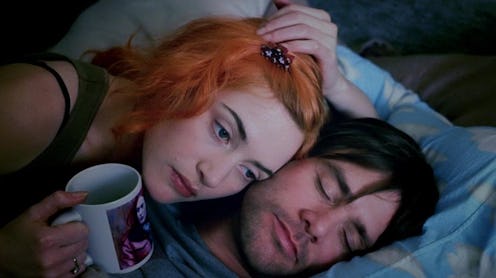Entertainment
'Eternal Sunshine Of The Spotless Mind' Isn't Nearly As Depressing As You Remember It

Love, relationships, and life are all ever-changing: not always joyful and not always sad, but shifting back and forth between moments of bliss and emotional destruction. Few movies capture that see-saw of ups and downs like 2004's Eternal Sunshine of the Spotless Mind, which turns 15 this March. While you might remember the movie as having nothing but sorrow, with an especially tragic ending, that's actually not the case. If you look back on it now, you'll realize that Eternal Sunshine is actually far less depressing than you remember.
Spoilers ahead. As you probably recall, Eternal Sunshine portrays the relationship between Joel (Jim Carrey) and Clementine (Kate Winslet) in non-linear fashion, with fragmented memories and flashbacks. After their breakup, Joel learns that Clementine has had all memories of him erased by a company called Lacuna in a bizarre neurological procedure. In retaliation, Joel has the same procedure performed on himself, though he ends up regretting the decision. As such, he fights to save his memories of Clementine as they wander in and out of his mind, and although his attempts are unsuccessful, the end of the movie reveals that he and Clementine do indeed find each other again despite having no recollection of their previous relationship. Through the actions of a disgruntled Lacuna employee, though, they learn about their former romance, and have to decide whether or not to try again.
I remember seeing Eternal Sunshine in theaters with my now-husband, and in hindsight, it probably wasn't the best date movie. When, afterwards, we discussed the ending, we realized that we had drastically different views of what had happened, and we put a lot of meaning into that. Did him thinking that by getting back together, Joel and Clementine were about to embark on an inevitable cycle of misery, mean that he was a pessimist? Or did my view that Joel and Clementine were going to have a happy ending label me as naive? Really, should we have just quit right then, before we hurt each other like the relationship we had watched unfold on screen?
We weren't alone in having different takes on the ending. The finale of Eternal Sunshine is perpetually debatable, with passionate followers on both sides. Some call it tragic, while others call it hopeful. Some, like my husband, say that Joel and Clementine's reunion proves that they're trapped in an endless cycle of pain and that they'll go on hurting each other and erasing each other for years on end. Others, like me, believe that it's destiny that intervenes; Joel and Clementine are meant to be together, so despite their efforts, the universe brings them back to one another. I believe this is the real ending — that love overcomes, overpowers, and outsmarts even our most sinister urges. It's hopeful, not depressing.
Yet even those involved with the film have wavering opinions on the movie's ending. As IndieWire reports, an early draft of Charlie Kaufman's script ended with Clementine returning to Lacuna for a 15th time to erase Joel, "the pair stuck in an endless loop of infatuation and recrimination." In a 2004 interview with Christianity Today, however, the screenwriter said, "I think that the ending of the movie is pretty open to interpretation...We know tentatively this sort of tentative decision they’ve made to try again, but we don’t know where that’s going."
Gondry, in the same interview, had a different interpretation, saying, "People see fate in things — they go together because they are meant to be together... It’s very slight little event that makes them stay together or destroys them. It could be this one single little thing that could influence the rest of their lives… It’s nice to show these nice little fragile moments."
It's those fragile moments, good and bad, that make up our lives and relationships, and for better or for worse, we need them all: the happy and the sad, the pain and the joy. Winslet told ThoughtCo. in 2004 that she'd never erase even her worst memories, saying, "I don’t really believe in the idea of that process. I just think that the good and the bad experiences that we all have in our lives are what forms us as human beings." Carrey told ThoughtCo. in a separate interview that, "In retrospect it always seems to work out that you can look back on something that was a disaster and find some gems in there."
Much like our own memories of past failed relationships, our memories of Eternal Sunshine might be tainted with a feeling of dread, but as Carrey said, there are gems hidden in the trauma. Even though the ending might hint that Joel and Clementine will repeat their past mistakes and hurt each other again, the movie, in my mind at least, also says that it's all worth it. Moments of happiness with another person and the love we experience make us who we are. Joel and Clementine's decision to give it another go isn't about being trapped or confronting destiny — it's about deciding that the journey is worth taking, even if there is potential for the end to fall apart.
We know there's going to be joy in our lives. We also know there's going to be pain. So all we can really do is look at life head on and, like Joel and Clementine, not be scared to walk right into it.